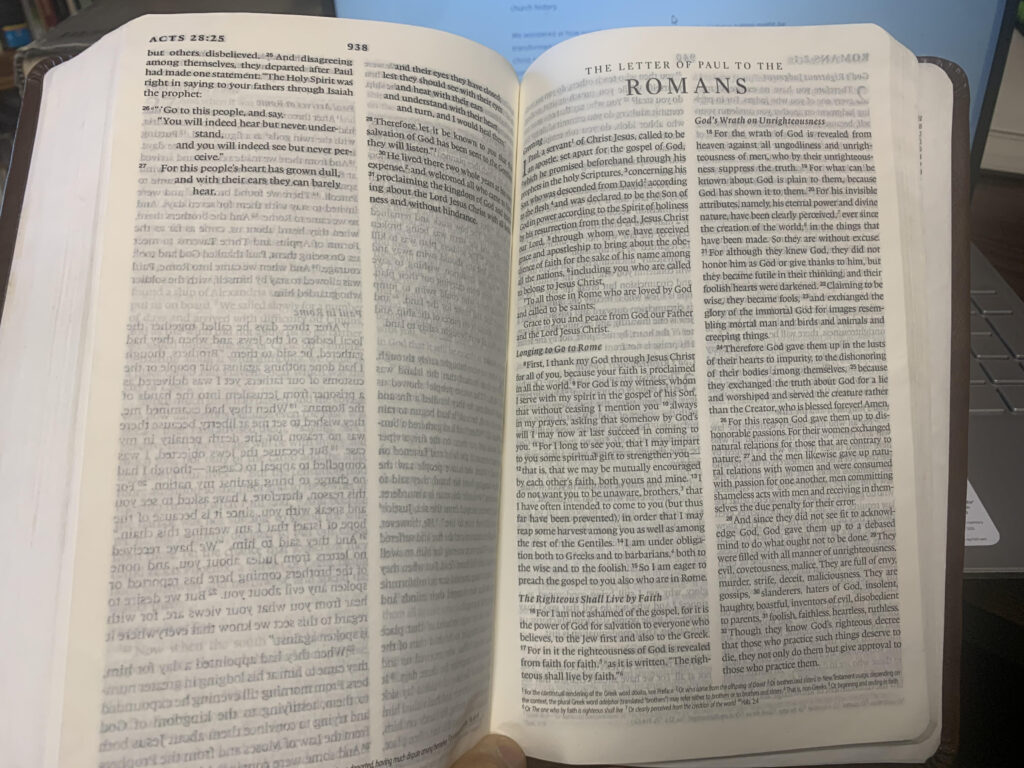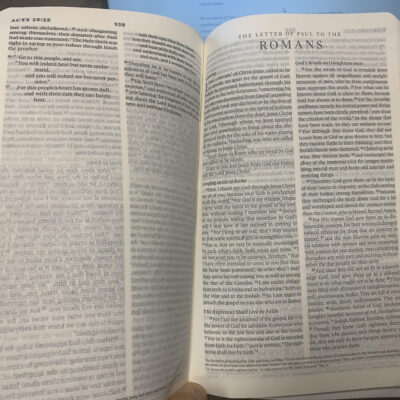Foundations- Chp 1
Read:

Although the light of nature, and the works of creation and providence do so far manifest the goodness, wisdom, and power of God, as to leave men unexcusable; yet are they not sufficient to give that knowledge of God, and of His will, which is necessary unto salvation: therefore it pleased the Lord, at sundry times, and in divers manners, to reveal Himself, and to declare that His will unto His Church; and afterwards, for the better preserving and propagating of the truth, and for the more sure establishment and comfort of the Church against the corruption of the flesh, and the malice of Satan and of the world, to commit the same wholly unto writing; which maketh the Holy Scripture to be most necessary; those former ways of God’s revealing His will unto His people being now ceased. (WCF 1:1)
See Psalm 19:1-4; Rom 2:14-15; Rom 1:18-19; 32-2:1; John 17:3; 1Cor 1:21; 2:13-14; Heb 1:1-2; Luke 1:3-4; Rom 15:4; Matt 4:4, 7, 10; Isa 8:20; 2 Tim 3:15; 2 Pet 1:19; John 20:31; 1 Cor 14:37; 1 John 5:13; 1 Cor 10:11; Heb 2:2-4
1st Q-How and Why God makes himself known.
Defining the Terms:
Kinds of Revelation of God:
* General Revelation-
– what are two kinds of general revelation mentioned in the opening line?
-what does it declare? How does this impact how you engage non-believers?
* Special Revelation-
-What are the limitations of general revelation and the former ways of God’s revealing his will?
-Give an example of “sundry times, and in divers manners.”
* Inscripturated Special Revelation-
-Why was scripture necessary and what is its ultimate purpose? How should this purpose affect how you read and study the bible?
-How would you respond to someone who claimed to have personal revelation from God?
Read: Under the name of Holy Scripture, or the Word of God written, are now contained all the books of the Old and New Testament, which are these: Of the Old Testament: Genesis Exodus Leviticus Numbers Deuteronomy Joshua Judges Ruth I Samuel II Samuel I Kings II Kings I Chronicles II Chronicles Ezra Nehemiah Esther Job Psalms Proverbs Ecclesiastes The Song of Songs Isaiah Jeremiah Lamentations Ezekiel Daniel Hosea Joel Amos Obadiah Jonah Micah Nahum Habakkuk Zephaniah Haggai Zechariah Malachi Of the New Testament: The Gospels according to Matthew Mark Luke John The Acts of the Apostles Paul’s Epistles to the Romans Corinthians I Corinthians II Galatians Ephesians Philippians Colossians Thessalonians I Thessalonians II To Timothy I To Timothy II To Titus To Philemon The Epistle to the Hebrews The Epistle of James The first and second Epistles of Peter The first, second, and third Epistles of John The Epistle of Jude The Revelation All which are given by inspiration of God to be the rule of faith and life. (WCF 1:2)
The books commonly called Apocrypha, not being of divine inspiration, are no part of the canon of the Scripture; and therefore are of no authority in the Church of God, nor to be any otherwise approved, or made use of, than other human writings. (WCF 1:3)
See Luke 16:29, 31; 24:27, 44; 2 Tim 3:15-16; John 5:46-47; Rev 22:18-19; Rom 3:2; 2Pet 1:21.
*The first paragraph told us why revelation was necessary. The second and third paragraphs discuss the Word of God written and define what is and is not scripture.
* How is Scripture set apart from all other books? How should this inform our life and doctrine?
* How might we be tempted to add or take away from the Scriptures? How does Rev 22:18-19 apply?
* Hebrews 4:12 tells us that God’s word is living and active, and 1 Peter 1:23 tells us that it is living and enduring. What are the implications for those of us who have the whole Bible?
* How should Christians treat the books called, “Apocrypha?” Should they be read at all?
“Those who embrace this Scripture, believe what it promises, and walk by its precepts, will never be without a guide or a light, and they will find their way to their Father’s home.”
Chad Van Dixhoorn.
2nd Q. How do we come to trust the word of God written, the scriptures?
Read:
The authority of the Holy Scripture, for which it ought to be believed, and obeyed, dependeth not upon the testimony of any man, or Church; but wholly upon God (who is truth itself) the author thereof: and therefore it is to be received, because it as the Word of God. (WCF 1:4)
We may be moved and induced by the testimony of the Church to an high and reverent esteem of the Holy Scripture, and the heavenliness of the matter, the efficacy of the doctrine, the majesty of the style, the consent of all the parts, the scope of the whole, (which is to give all glory to God), the full discovery it makes of the only way of man’s salvation, the many other incomparable excellencies, and the entire perfection thereof, are arguments whereby it doth abundantly evidence itself to be the Word of God; yet, notwithstanding, our full persuasion and assurance of the infallible truth, and divine authority thereof, is from the inward work of the Holy Spirit, bearing witness by and with the word in our hearts. (WCF 1:5)
See 2 Pet 1:19-20; 2Tim 3:16; 1Thess 2:13; Rev 1:1-2; 1Tim 3:15; 1Cor 2:9-10; Heb 4:12; John 10:35; Isa 55:11; Rom 11:36l Psa 19:7-11; 1Thess 1:5; 1 John 2:20, 27; Isa 59:21.
*Upon what basis should we trust in Scripture? How does the Scripture itself support these conclusions?
* What are some of the “abundant evidences” that the Bible gives us which testify that it is the Word of God?
* How does one receive assurance that the Bible is written by God and trustworthy? Where did you receive assurance it was God’s word? How might this bring you comfort?
* How does your understanding of the ministry of the Holy Spirit (John 16:13-14; 1 Cor 2:10-12) help you to respond to those who claim that human beings cannot know God?
*Map out God’s revelation and our reception of it on a Plan of Salvation Redemptive Historical Timeline:
Creation -> Fall -> Redemption (Now & Not Yet) -> Consummation
Suggested Resources:
G.I. Williamson, The Westminster Confession of Faith for Study Classes, 2nd Edition.
Chad Van Dixhoorn, Confessing the Faith.
WCF Facts:
Westminster Assembly met for 11 years (1643-1653) in London. 1163 sessions.
It was comprised of 120 theologians.
Goal was to purge England of many appalling preachers.
WCF was finished in 1646 (12000 words, 33 Chapters).
Extremely useful for understanding scriptural words and phrases.
- The notes above summarize the first two classes of our Sunday School Class: “Truth for Life.” If you have questions you can contact us at admin@trinitynorman.com. We hold these discussions live at 9:45am on Sundays at 428 W. Lindsey.


